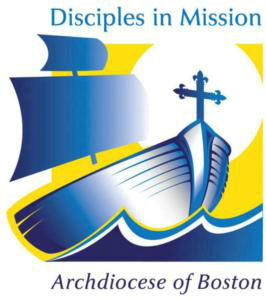'A New Pentecost'
In his 2011 Pastoral Letter, "A New Pentecost: Inviting All to Follow Jesus," Cardinal Seán O'Malley sets the scene: "We remember particularly how the disciples were gathered in fear and confusion as they hid in the Upper Room. At that moment, they lacked a sense of outward mission and purpose. Christ then sent the Holy Spirit to them and a great transformation occurred." ("A New Pentecost" 1)
This pastoral letter, filled with wisdom, inspiration, and direction, affirms what all Catholics know in their bones: It is in the parish, "...where most Catholics experience the Church...It is from the parish that we are each called to take Christ and to bring him to friend and stranger alike. And it is to the parish that we return, by God's grace, with others who are ready to embrace Christ fully as members of the household of God." (6)
On June 3, 43 parishes began living out a new leadership model. They are grouped into 20 collaboratives, Phase II of the pastoral plan Disciples in Mission. We pray for the success of these collaboratives and also celebrate the first anniversary of the 28 parishes in 12 Phase I collaboratives. With Cardinal Seán's pastoral letter as a foundation, the feast of Pentecost might be a good time to look at the pastoral plan, evangelization, and parish life.
Cardinal O'Malley is firm about not closing parishes, but projections clearly show that the number of parishes and the number of priests available to serve do not match. Losses due to illness, retirement, and death outpace the number of priests being ordained or coming from other diocese and countries to serve here. When Disciples in Mission was approved in 2012 there were 288 parishes in the archdiocese. Forming these parishes into 135 Collaboratives, made up of one or more parishes, with one pastor operating out of this new model, means that parishes can remain open.
Long-range planning identified four core deficits:
-- Lack of priests;
-- Lack of trained and accredited lay ecclesial ministers (e.g. directors and coordinators of religious education, and pastoral associates);
-- Lack of money to pay operating expenses, and;
-- Shrinking participation at Mass. The percent of self-identified Catholics in the Archdiocese of Boston who faithfully attend Sunday Mass each week is under 17 percent.
Speaking about these deficits, Father Paul Soper, director of the Office of Pastoral Planning says, "Fixing the first three is impossible without fixing the final one."
How do we address the problem of diminished participation at Mass? Enter the new evangelization. What's new about evangelization? Haven't we been evangelizing since Jesus' Ascension? Yes, and the goal is the same: introduce people to Jesus Christ, make disciples, teach what Jesus taught (Mt 28:19). But wait, there's more.
In his pastoral Cardinal Seán states:
"Evangelization means simply to share the Gospel, the Good News, through word and deed. That is why the four Gospel writers, Matthew, Mark, Luke and John, are called 'Evangelists' ... The Church exists to evangelize ... We are called to do many things in the Church, but our primary mandate given by Jesus and powered by the Holy Spirit is to evangelize.(5)
"... the parish is the chief venue where that activity [evangelization] must take place. Our parishes must be true centers of evangelization ...
Some may ask, 'Why must we evangelize? Our parish is fine as it is.' We evangelize so that people can know the purpose for which they are made and so that as many as possible will be brought to Christ and ultimately, through Christ's saving love, to the eternal presence of God in heaven. ... Our love for every person makes us want to extend this invitation on Christ's behalf." (6)
The new evangelization is evangelization as we have always understood it, but it has a new zeal. It uses new methods such as social media, and it has an additional goal: to help people return to the practice of the faith and a renewed relationship with Christ. It isn't preachy, pushy, or moralistic. Faithful Catholics attuned to the new evangelization are confident and willing to share their faith. They don't shy away from admitting that the practice of the faith is important.
It can be this simple:
Location: coffee shop, water cooler, gym, dog park ...
Time: Monday morning or lunch time
Conversation:
A: How was your weekend? Do anything special?
B: Nothing special, went out to dinner Friday night. And, oh, at Mass on Sunday, I heard this really great homily. It stuck in my mind all day. Let me give you the two minute version. I think it will strike you too and I'd love to hear what you think ...
Or,
B: Nothing special, went to dinner Friday night. And, oh, at Mass on Sunday, we sang this hymn that I had never heard before but the words and tune were wonderful. I went home and downloaded it because I want to listen to it again. Want to hear it, I think you'll like it too?
The pastoral plan is about evangelization and strengthening parishes. Phase I parishes faced -- and face -- definite challenges and bumps in the road. But there is a renewed sense of energy, shared mission, and zeal for evangelization. These collaboratives are intentional in their outreach and sincere in their desire to be welcoming communities of faith, centers of the new evangelization. We hope and pray that this continues in Phase II collaboratives.
The transformation that cardinal wrote about is happening today. It seems that the Holy Spirit is working in us and among us in these 71 parishes, 32 collaboratives. Now is the time. Come Holy Spirit, Veni Sancte Spiritus.
The full text of "A New Pentecost" is available in English, Spanish and Portuguese at www.bostoncatholic.org/pentecostletter.aspx.
Susan Abbott is Coordinator of Parish Outreach for the Archdiocese of Boston's Office of Pastoral Planning.
- SUSAN ABBOTT IS EVANGELIZATION ASSOCIATE, OUR LADY OF GOOD VOYAGE SHRINE.



















